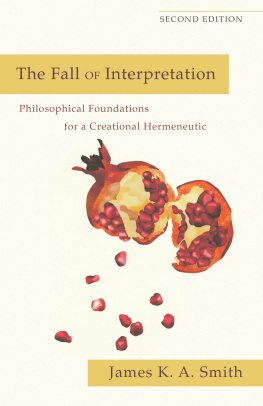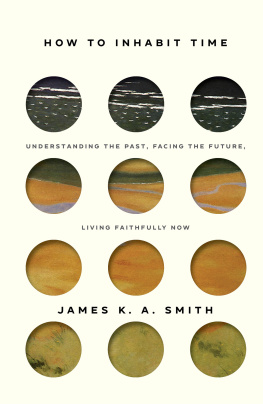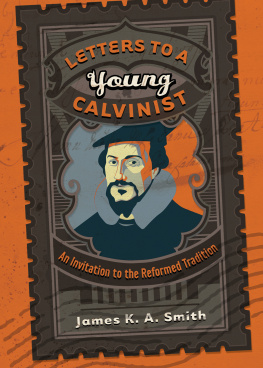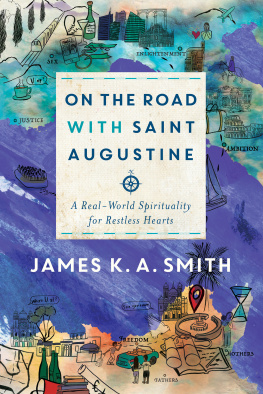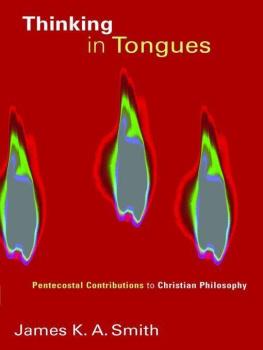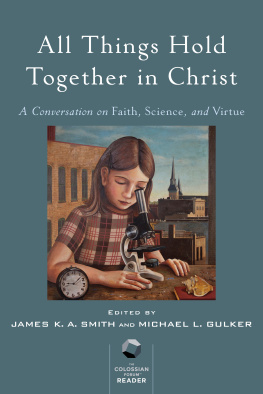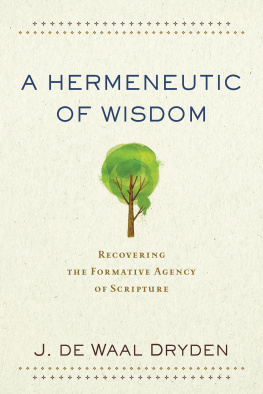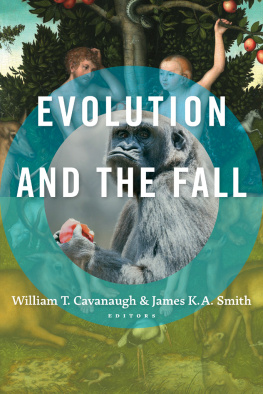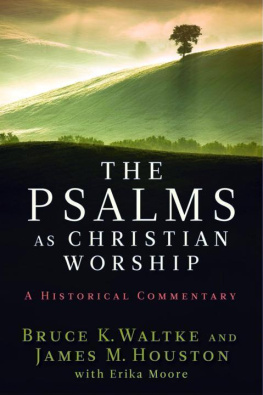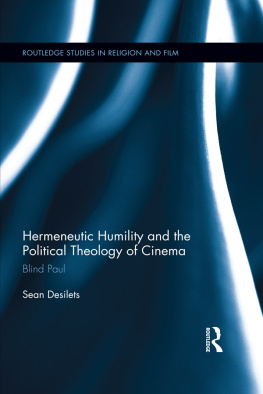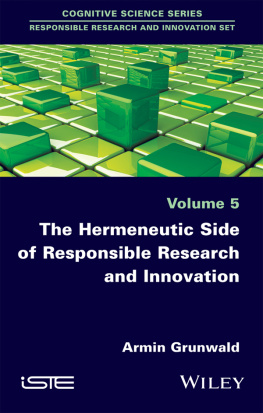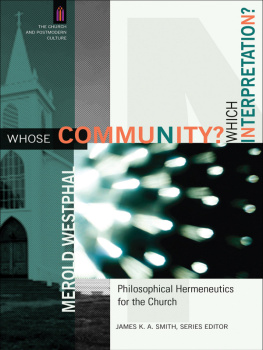James K. A. Smith - The Fall of Interpretation: Philosophical Foundations for a Creational Hermeneutic
Here you can read online James K. A. Smith - The Fall of Interpretation: Philosophical Foundations for a Creational Hermeneutic full text of the book (entire story) in english for free. Download pdf and epub, get meaning, cover and reviews about this ebook. year: 2012, publisher: Baker Publishing Group, genre: Religion. Description of the work, (preface) as well as reviews are available. Best literature library LitArk.com created for fans of good reading and offers a wide selection of genres:
Romance novel
Science fiction
Adventure
Detective
Science
History
Home and family
Prose
Art
Politics
Computer
Non-fiction
Religion
Business
Children
Humor
Choose a favorite category and find really read worthwhile books. Enjoy immersion in the world of imagination, feel the emotions of the characters or learn something new for yourself, make an fascinating discovery.
- Book:The Fall of Interpretation: Philosophical Foundations for a Creational Hermeneutic
- Author:
- Publisher:Baker Publishing Group
- Genre:
- Year:2012
- Rating:5 / 5
- Favourites:Add to favourites
- Your mark:
- 100
- 1
- 2
- 3
- 4
- 5
The Fall of Interpretation: Philosophical Foundations for a Creational Hermeneutic: summary, description and annotation
We offer to read an annotation, description, summary or preface (depends on what the author of the book "The Fall of Interpretation: Philosophical Foundations for a Creational Hermeneutic" wrote himself). If you haven't found the necessary information about the book — write in the comments, we will try to find it.
The Fall of Interpretation: Philosophical Foundations for a Creational Hermeneutic — read online for free the complete book (whole text) full work
Below is the text of the book, divided by pages. System saving the place of the last page read, allows you to conveniently read the book "The Fall of Interpretation: Philosophical Foundations for a Creational Hermeneutic" online for free, without having to search again every time where you left off. Put a bookmark, and you can go to the page where you finished reading at any time.
Font size:
Interval:
Bookmark:
2000, 2012 by James K. A. Smith
Published by Baker Academic
a division of Baker Publishing Group
P.O. Box 6287, Grand Rapids, MI 49516-6287
www.bakeracademic.com
Ebook edition created 2012
Ebook corrections 08.16.2022
All rights reserved. No part of this publication may be reproduced, stored in a retrieval system, or transmitted in any form or by any meansfor example, electronic, photocopy, recordingwithout the prior written permission of the publisher. The only exception is brief quotations in printed reviews.
ISBN 978-1-4412-3632-6
Unless otherwise indicated, all Scripture quotations are from the New Revised Standard Version of the Bible, copyright 1989, by the Division of Christian Education of the National Council of the Churches of Christ in the United States of America. Used by permission. All rights reserved.
Baker Publishing Group publications use paper produced from sustainable forestry practices and post-consumer waste whenever possible.
For Deanna,
still, always.
There is a kind of striving that is appropriate to a human life; and there is a kind of striving that consists in trying to depart from that life to another life. This is what hubris isthe failure to comprehend what sort of life one has actually got, the failure to live within its limits... the failure, being mortal, to think mortal thoughts. Correctly understood, the injunction to avoid hubris is not a penance or denialit is an instruction as to where the valuable things for us are to be found.
Martha Nussbaum, Loves Knowledge: Essays on Philosophy and Literature (Oxford: Oxford University Press, 1990), 381.
I was doing a lot of different things at every moment. Even as I was crying, I was also scanning the ground for the missing piece of my tent, and taking my camera out of my pocket and trying to capture the celestial beauty of the light and the landscape, and damning myself for doing this when I should have been purely mourning, and telling myself that it was O.K. that Id failed in my attempt to see the rayadito in what would surely be my only visit to the islandthat it was better this way, and that it was time to accept finitude and incompleteness and leave certain birds forever unseen, that the ability to accept this was the gift Id been given and my beloved dead friend had not.
Jonathan Franzen, Farther Away: Robinson Crusoe , David Foster Wallace, and the Island of Solitude, The New Yorker , April 18, 2011, 93.
All practice divination, however intermittently, erroneously, dishonestly, or disappointedly; most of all, disappointedly. For whether one thinks that ones purpose is to re-cognize the original meaning, or to fall headlong into a text that is a treacherous network rather than a continuous and systematic sequence, one may be sure of one thing, and that is disappointment. It has sometimes been thought, and in my opinion rightly, that the world is also like that.... In any case, a sense of mystery is a different thing from an ability to interpret it, and the largest consolation is that without interpretation there would be no mystery. What must not be looked for is some obvious public success. To see, even to perceive, to hear, even to understand, is not the same thing as to explain or even the same thing as to have access. The desires of interpreters are good because without them the world and the text are tacitly declared to be impossible; perhaps they are, but we must live as if the case were otherwise.
Frank Kermode, The Genesis of Secrecy: On the Interpretation of Narrative (Cambridge, MA: Harvard University Press, 1979), 126.
: An Introduction to the Second Edition
: Interpretation and the Fall
: From Creation to Ecclesia
A ll of the debts acknowledged in the preface to the first edition still holdindeed, my indebtedness has only accrued interest. I remember with gratitude the communities that supported me during the formative period that produced this book. But I did neglect to acknowledge one debt at that time, and Im glad to rectify it now: Rodney Clapp took a risk on me, recruiting this book while he was still an editor at InterVarsity Press and while I was an upstart first-time author. Returning to this book after a number that have followed, Im grateful for Rodneys help at the beginning of my career. Im also grateful to Bob Hosack, Jim Kinney, BJ Heyboer, Jeremy Wells, Wells Turner, Paula Gibson, Caitlin Mackenzie, and Dwight Baker for all of the ways that they support and encourge me as an authornot least in welcoming The Fall of Interpretation to join my other books in the Baker Academic catalog. It is an honor to partner with them. Thanks are also due to Coleson Smith, who helped me with the indexes at the eleventh hour.
Finally, Im grateful for two little treats of providence as I finish this second edition and dispatch it to my editor. First, I write this from a room at Trinity College at the University of Toronto (with thanks to Dean David Neelands for the opportunity to serve here as a visiting professor), in the environs that gave rise to the first edition when I was a graduate student at the Institute for Christian Studies, just a block away from my window. Across the street from my room is Wycliffe College, where I spent many an afternoon holed up in the reading room, and around the corner is Knox College, whose stained-glass library space was a veritable sanctuary of thought for me while I was wrestling with the argument of this book. The ominous architecture of Robarts Library at the University of Toronto towers over the spires of Trinity College, and combing through the footnotes of The Fall reminds me of the books housed in Fort Robarts. Like Prousts madeleine cookie, the sights and smells of my education in Toronto have wafted back into my imagination while I was working on this revised edition, so it is a special blessing to be able to once again cast the argument upon the waters from here in Toronto. The second birth of this book is taking place in its original delivery room.
Second, I pen this final page on Pentecost Sundaythe feast that commemorates both the sending of the Spirit and the founding of the church. While the first edition of The Fall of Interpretation was Pentecostal insofar as it was pneumatic, I hope this second edition is Pentecostal by also being ecclesial.
University of Trinity College in the University of Toronto
Pentecost 2011
I n many respects the telos (purpose) of this book lies beyond its scope, outside the margins, as does its arch (origin). In good Pentecostal fashion, and following the model of Augustine, the project of this book is born out of my own experience of interpretive difference, or more specifically, the experience of having interpretations that differed from the interpretations of those who thought themselves to be in possession of the one true interpretationwhich was not an interpretation at all but simply what God said. (Augustine has something to say about them in his Confessions , book 12.) While it may not be immediately evident, this book has an ecclesial destination grounded in its ecclesial genesis. As those closest to me would know, it reads as something of an apologia on behalf of difference within the community. And, as has become increasingly evident to me, it is a book that has been penned with wounds. Having been at times excluded from my own tradition for being too different, I have aspired through this book to make space for difference within our communities.
But while the books impetus is found in this experience of exclusion, its writing has been made possible by the welcoming and healing communities that my family and I have since been a part ofone during the books conception and gestation, the other during its labor and birth. I would like to say a special thank you to Rev. Charles Swartwood, Patrick and Dorothy St. Pierre, and the saints at Bethel Pentecostal Tabernacle, who embraced us as we made our way up to Pentecost. Thanks also to Rev. Ron Billings, Rev. Al Wise, David and Stephanie Burton, and our brothers and sisters at Horsham Christian Fellowship and Del Aire Assembly of God, who have encouraged us to keep the feast. It will be a surprise to many, but not to us, that these Pentecostal communities have been a source of unflagging support for my academic endeavors.
Font size:
Interval:
Bookmark:
Similar books «The Fall of Interpretation: Philosophical Foundations for a Creational Hermeneutic»
Look at similar books to The Fall of Interpretation: Philosophical Foundations for a Creational Hermeneutic. We have selected literature similar in name and meaning in the hope of providing readers with more options to find new, interesting, not yet read works.
Discussion, reviews of the book The Fall of Interpretation: Philosophical Foundations for a Creational Hermeneutic and just readers' own opinions. Leave your comments, write what you think about the work, its meaning or the main characters. Specify what exactly you liked and what you didn't like, and why you think so.

